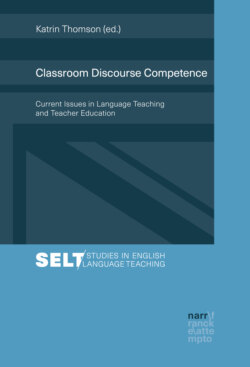Читать книгу Classroom Discourse Competence - Группа авторов - Страница 12
На сайте Литреса книга снята с продажи.
2 Overview: Existing Concepts, Recent Developments and Current Challenges 2.1 Target Language Proficiency vs. L2 Classroom Discourse Competence – Terminological Issues
ОглавлениеIn scholarly discussions about FL-related dimensions of language teachers’ professional competence, a plethora of different terms and concepts has emerged. These include, among others: teachers’ ‘linguistic skills’, ‘linguistic abilities’, ‘linguistic competences’ (all in Kuster et al. 2014a), ‘classroom interactional competence’ (Walsh 2006 and ff.), ‘target language proficiency’ (Richards et al. 2013), ‘profession-related language competence’ (Kuster et al. 2014a), ‘classroom discourse competence’ (Thomson 2020a), or with regard to publications in German, ‘(didaktische) kommunikative Kompetenzen (Hallet 2006), ‘Sprachkönnen in der Fremdsprache’ (KMK 2019), ‘Sprachkompetenz’ (Bleichenbacher et al. 2016), ‘sprachpraktische Kompetenzen’, ‘sprachpraktische Fähigkeiten’ (both in Roters et al. 2013), ‘sprachliche Handlungsfähigkeit’ (Roters et al. 2014) and ‘fremdsprachenunterrichtliche Diskurskompetenz’ (see Thomson, “Introduction” in this volume) – to name but a few. This variety of different labels is an indicator of a certain terminological and conceptual indeterminacy as regards the question of what language-related aspects actually contribute to teachers’ professionalism. After all, terms such as ‘language proficiency’ or ‘linguistic skills’ on the one hand carry different implications than, for instance, ‘profession-related language competence’ or ‘classroom discourse competence’ on the other: the latter denote context-specific professional competences with a clearly marked pedagogical dimension. This dimension, however, is missing from the first two terms (‘language proficiency’, ‘linguistic skills’), as is the aspect of context-specificity, i.e. the context of the language classroom, including its related learning environments beyond those spatial boundaries. Hence, it would be somewhat problematic to use these terms synonymously or to ignore the professional, pedagogical dimension in teachers’ classroom discourse competence altogether.
This however seems to be the case, for instance, in the KMK3 National Standards for Teacher Education in Foreign Languages in Germany (KMK 2019), where only one reference is made – not to FL teachers’ professional classroom discourse competence but – to the level of L2 proficiency that pre-service teachers are expected to have reached by the end of phase 1: “University graduates have acquired in-depth linguistic knowledge [‘Sprachwissen’] and ‘native speaker-like’ L2 proficiency [‘‘nativnahes’ Sprachkönnen’]; they are able to maintain this level and constantly refresh their foreign language competence.” (ibid.: 44; translation KT). Apparently, the underlying assumption here is that, from a linguistic point of view, native speaker-like (or C2+) proficiency in the target language is the determining factor for successful or effective teaching. The quoted passage above also suggests that EFL teachers’ preferably ‘native-like’ L2 language use within classroom settings is apparently no different from target language use in everyday real-world communication – or, if this distinction was indeed implied in the above quote, that teacher candidates would somehow automatically be able to (a) recognize these differences and (b) transform general L2 use into “pedagogically processed” language (Widdowson 2002: 77), i.e. the kind of language that is conducive to FL learning in classroom settings, the kind of language that activates learners, the kind of language “which has been pedagogically treated so that it is made less alien and more accessible to learners” (ibid.: 78).
The importance of this ‘professional dimension’ in teacher talk and teacher-navigated classroom discourse has, by and large, been neglected in teacher education programs and in conceptualizations of EFL teachers’ professional competence as well. More than fifteen years ago, Hallet (2006), for instance, emphasized the vital importance of teachers’ ‘professional discourse competence’, yet at the same time found that most competence models up until then did not even explicitly mention it. The author, therefore, concluded:
Actually, […] [discourse competence] deserves to receive more attention and ought to be given a central position in every competence model, given the fact that all processes of teaching and learning are language-based and […] therefore rely on continual communication and negotiation between all classroom participants. […] A precise description of this competence is required for it to gain a professional dimension and to move beyond the notion of everyday communication.” (Hallet 2006: 127, 129, 130; translation and emphasis KT)
In foreign language teacher education and research in Germany, both of these calls have remained unanswered so far. While Shulman’s taxonomy (see Fig. 1) has been expanded to now also include a ‘linguistic component’ (“Sprachliche Handlungsfähigkeit”) in Roters et al.’s (2014) model of EFL teachers’ professional competence (see Fig. 2), the necessary distinction between teachers’ general foreign language communicative competence and a professional L2 classroom discourse competence is not made there.
Fig. 2:
EFL Teachers’ Professional Competence and Professional Knowledge (Roters et al. 2014, based on Shulman 1987)
Moreover, this form of visualization puts teachers’ “sprachliche Handlungsfähigkeit” on the same level with the different types of knowledge that (prospective) EFL teachers need to acquire. Whether or not this form of visual representation is appropriate is in fact a question worth tackling. Thus, the stance taken here is that (a) a distinction has to be made between ‘language competence’ and ‘classroom discourse competence’ (CDC) if a professional dimension is to be taken into account, and that (b) a conceptualization of CDC does not only call for a ‘precise definition’ of its components but also for a visual representation in which it is ‘given a more central position’ that reflects its key role in EFL teacher professionalism.
